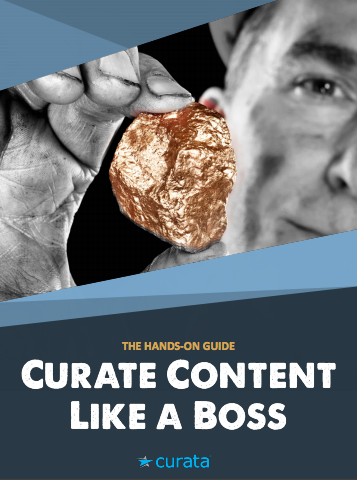- Share The Ultimate Guide to a Content Marketing Career on Facebook
- Share The Ultimate Guide to a Content Marketing Career on Twitter
- Share The Ultimate Guide to a Content Marketing Career on Linkedin
- Share The Ultimate Guide to a Content Marketing Career via email
Curata and LinkedIn have joined forces to pool our data and bring you the Ultimate Guide to a Content Marketing Career. It’s for everyone interested in a new content marketing career—or advancing your current one. Combining data from Curata’s survey of 1,000+ marketers, and LinkedIn’s 450 million worldwide profiles, this guide offers insights about the state of the sector right now, and potential content marketing career trajectories. (Check out Curata’s guide to Content Marketing Interview Questions and Answers.)
The associated eBook, The Ultimate Guide to a Content Marketing Career, also includes observations from content marketing experts Ann Handley, Chief Content Officer, Marketing Profs; Joe Pulizzi, Founder, Content Marketing Institute; and Joe Chernov, Vice President of Marketing, InsightSquared.
We wrote this guide because content marketing is growing by leaps and bounds. It’s no longer just a function of the marketing team. As Seth Godin, author and oracle, famously said, “Content marketing is the only marketing left.”
The average consumer has stopped paying much attention to traditional marketing and advertising. Decades of disruptive intrusions that are too often calculatingly misleading have taken their toll. Content marketing takes a different approach to reach and engage customers, one that’s less intrusive and treats them more respectfully. Great content marketing offers something valuable to an audience, with no obligation to repay that offering. It is entertaining, insightful, relevant, and useful writing, graphics, video and/or audio. It seeks to establish a relationship with a relevant audience built on trust. So when it comes to business time, prospects choose you over a competitor. Content Marketing Institute research found 88 percent of companies are now using content marketing.
Accordingly, companies are stepping up their investment in content marketing staffing, technology, and strategy. According to Curata research, this year 75 percent of respondents are “increasing” or “significantly increasing” their investment in content marketing, because it’s a sophisticated marketing method that works.
Companies Can’t Keep up With Their Content Needs
Companies continue to struggle to produce enough high-quality content to feed the beast. Which may be why 70 percent plan to produce even more content this year.
Unfortunately, only 30 percent rate their efforts as “effective” or “very effective.” That’s no doubt partly because their content often just isn’t good enough. Traditional marketers aren’t always well trained in proofreading and editing. They’re used to listing features, rather than telling a story that captures people’s attention and keeps them engaged. Companies also have a hard time tapping into the insights of internal and external Subject Matter Experts (SMEs), and finding top sources to create amazing content.
Companies need more—and better—content. As a result, we’re experiencing a surge in hiring specifically for content marketers. According to Curata research, as many as 43 percent of companies are hiring more employees specifically to produce content. And there were more than 19,000 content marketing jobs posted on LinkedIn’s platform in fall 2016.
The Role of Content Marketer Comes Into Focus
We now have a better idea of the skills marketers need to excel in a content marketing career—which fall outside of the normal scope of traditional marketers’ skill sets.
Strong writing skills and a high grammar aptitude are essential of course. But many organizations want writers with journalism experience, specifically with a newspaper or other journalistic enterprise. They want engaging, well-researched, in-depth feature articles, interviews, and newsworthy pieces. This means hiring strong storytellers with research skills who can work in high-pressure situations. Also in demand are writers who have written for websites and blogs, or contributed as guest posters to high-profile blogs.
A writing portfolio is important. But more critical is your ability to express the voice and opinion of the company and its brand, and adapt your writing as needed. That can often be hard even for experienced writers who have already developed their own voice. So entry-level writers can be successful if they are willing to be flexible.
You need more than writing skills
That said, it takes more than just great writing chops. Content marketers have to master search engine optimization (SEO), specifically integrating keywords into writing in a natural way. Companies also want people who can edit content, either their own or other writers’, quickly and efficiently. Clean, error-free copy is critical, because most companies don’t have the time to go through several rounds of editing.
Design skills are also increasingly coveted, so writers can double as writer and designer to meet deadlines. Technical skills are also sought-after; content marketers often must work in WordPress or other content management systems. Some companies are even looking for candidates who can edit and produce video, animation, and images.
The best content marketers are quality writers. They have a strong marketing acumen, tech savviness—and a good dose of passion for what they do.
LinkedIn profile data shows that compared with other marketers, members who identify as content marketers are more likely to boast certain computer-related and other technological skills. Content marketers over-index on the following tech and software skills, according to LinkedIn profile data:
Members identifying as content marketers are also much more likely to have certain basic skills than other marketers. Content marketers massively over-index on the following skills compared with other marketers, according to LinkedIn profile data:
There’s Plenty of Opportunity for Content Marketing Career Advancement
 There are 2.8 times as many content marketing jobs available on LinkedIn as there are product marketing jobs. There are also more content marketing openings than brand marketing openings (5.5 times) or demand generation openings (9.4 times). That’s a lot of opportunity for a content marketing career.
There are 2.8 times as many content marketing jobs available on LinkedIn as there are product marketing jobs. There are also more content marketing openings than brand marketing openings (5.5 times) or demand generation openings (9.4 times). That’s a lot of opportunity for a content marketing career.
While entry-level positions are certainly available, companies are also looking for executives to manage their content marketing strategy. Fifty one percent of companies anticipate having an executive in place to manage their content marketing efforts in 2017. (That’s up from 42 percent in 2016.) Small companies with less than $10 million revenue, and large companies with $1 billion+ revenue should see a 30 percent increase in staffing for the lead role in 2017. Room for advancement at all levels.
Where are you most likely to have a content marketing career in America? According to LinkedIn data, it’s where you’d expect. Mostly clustered around a few select major city centers: New York, San Francisco, Chicago, Los Angeles, and Seattle.
The salaries for content marketing jobs also vary widely. Payscale analysis of open content marketing jobs on LinkedIn shows the majority of jobs fall below $80,000 in annual salary.

The Hottest Industries for Content Marketers
Curata research confirms the technology sector is where you’re most likely to have a content marketing career. This includes the computer hardware, software, IT services and telecommunications industries.

What you Need to do to Succeed in a Content Marketing Career
Any organization with a marketing team and a website can publish content, and many do just that. But even the very best writers in the world can crash and burn as content marketers. There is much more to the job than “just” creating content. You need a strategic approach to develop content that addresses buyers’ needs while serving a measurable business objective.
Content marketers have to be far more than just content creators. They must also be able to:
Adopt a documented strategy with measurable goals
Content marketers must outline the purpose of their content and define measurable goals for it. A documented strategy, such as The Content Marketing Pyramid, improves a content marketing team’s focus by establishing clear priorities, while also making more efficient use of valuable resources and creating a predictable stream of successful content. The strategy and mission guides the content your team creates, where it will be published, and what business goals it should drive. This is big-picture thinking that goes well beyond the day-to-day content creation and curation.
Understand your target audience
The best content marketers can empathize with their customers and understand the world from their perspective. In fact, most of the top marketers LinkedIn interviewed for the Sophisticated Marketer’s Guide to Content Marketing said empathy was the most important trait they were looking for in a content marketer. To do the job well, understand buyers’ motivations, how they consume content, and their major pain points. This allows you to shape your content to meet buyers’ needs and answer their questions.
Investigate to uncover topics
As a content marketer you can’t just write about what you want. You have to dig deep and discover the type of information your customers want. That means working with sales and customer service to understand the questions customers are asking and challenges they’re facing. It means interviewing existing and potential customers. And using tools like BuzzSumo, UberSuggest, and Google AdWords Keyword Tool to find out what customers are searching for online.
Organize and plan well in advance
This may be one of the least well executed aspects of content marketing. Content marketers need to exhaustively plan the type of content they will create and when they will publish it. That means creating and maintaining an editorial calendar to ensure the most important topics are covered. And that a good mix of content—including infographics, videos, blog posts, and so on—is shared.
Leverage existing content
Effective content marketing strategies typically center around creating a core, long-form piece of original, insightful content, such as an eBook, webinar, survey or guide. Make the most of that asset. Create smaller repurposed content, such as infographics, long-form blog posts, SlideShares, and contributed content for external publications. Again, it’s about taking a broad view and figuring out how to maximize every piece of content the team develops. You can learn more about curating content when you download The Ultimate Guide to Content Curation.
The best content marketers curate roughly 25 percent of their content. This ensures you don’t have to create it all from scratch, and increases your credibility as an unbiased thought leader. Curata recommends a content mix of 65 percent created, 25 percent curated, and 10 percent syndicated content. Outsource around one third of your created content.
Analyze to make critical improvements
Content marketing leaders measure the impact of content in order to justify doing it. This means poring over data and assessing metrics to understand how a piece of content is performing against its goals. From there you can tweak content as needed to meet your goals. The Comprehensive Guide to Content Marketing Analytics & Metrics offers more insight into what goes into this type of analysis, but again, it requires big-picturing thinking, strategizing, and planning to ensure your content marketing ROI is worth it.
If you are looking to start a new content marketing career—or advance your current marketing role, jobs in content marketing offer good salaries, advancement opportunities, and the chance to do work that benefits your customers at the same time as boosting your company’s bottom line. For greater detail, download Curata and LinkedIn’s new joint eBook The Ultimate Guide to a Content Marketing Career.















